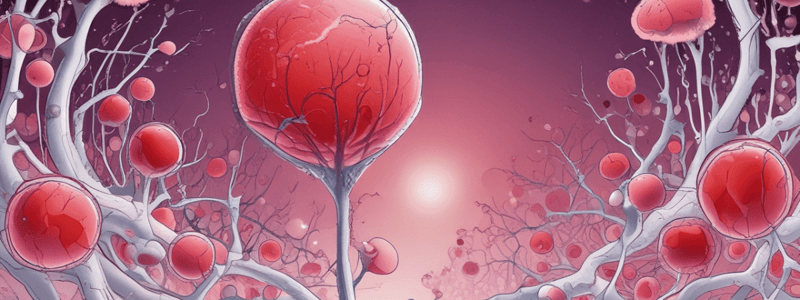Podcast
Questions and Answers
What are the typical diagnostic tools used to diagnose MDS?
What are the typical diagnostic tools used to diagnose MDS?
Complete Blood Count (CBC) and blood smear analysis, bone marrow biopsy and aspiration, and cytogenetic analysis
What is the primary goal of allogenic stem cell transplantation in MDS patients?
What is the primary goal of allogenic stem cell transplantation in MDS patients?
To provide a potentially curative treatment option
What are the primary factors that influence the prognosis of MDS patients?
What are the primary factors that influence the prognosis of MDS patients?
IPSS score, cytogenetic risk group, and response to treatment
What type of genetic mutations are commonly associated with MDS?
What type of genetic mutations are commonly associated with MDS?
What is the primary purpose of supportive care in MDS treatment?
What is the primary purpose of supportive care in MDS treatment?
What is the primary goal of low-intensity therapies in MDS treatment?
What is the primary goal of low-intensity therapies in MDS treatment?
What is the primary goal of high-intensity therapies in MDS treatment?
What is the primary goal of high-intensity therapies in MDS treatment?
What is the role of genetic testing in MDS diagnosis and treatment?
What is the role of genetic testing in MDS diagnosis and treatment?
What is the primary goal of investigational therapies in MDS treatment?
What is the primary goal of investigational therapies in MDS treatment?
What is the primary benefit of reduced-intensity conditioning regimens in allo-SCT?
What is the primary benefit of reduced-intensity conditioning regimens in allo-SCT?
Study Notes
Diagnosis
- Typically diagnosed through a combination of:
- Complete Blood Count (CBC) and blood smear analysis
- Bone marrow biopsy and aspiration
- Cytogenetic analysis (e.g., chromosomal analysis)
- Diagnosis based on World Health Organization (WHO) criteria, which includes:
- Dysplastic changes in ≥ 1 hematopoietic cell lineages
- Cytopenias (anemia, neutropenia, thrombocytopenia)
- Blast cells in peripheral blood or bone marrow ≥ 5%
Stem Cell Transplantation
- Allogenic stem cell transplantation (allo-SCT) is a potentially curative treatment option
- Indications for allo-SCT:
- High-risk MDS
- Multiple relapses
- Failure of other treatments
- Reduced-intensity conditioning (RIC) regimens are often used to reduce toxicity
Prognosis
- Prognosis varies depending on:
- IPSS (International Prognostic Scoring System) score
- Cytogenetic risk group
- Response to treatment
- Median overall survival ranges from 0.4 to 5.3 years, depending on IPSS score
- Patients with low IPSS scores have a better prognosis
Gene Mutations
- MDS is characterized by genetic mutations, including:
- Chromosomal abnormalities (e.g., del(5q), -7, +8)
- Gene mutations (e.g., ASXL1, TET2, TP53)
- Mutations can affect hematopoietic stem cell function and differentiation
- Genetic testing can help guide treatment decisions and prognosis
Treatment Options
- Supportive care:
- Blood transfusions
- Growth factors (e.g., erythropoietin)
- Low-intensity therapies:
- Hypomethylating agents (e.g., azacitidine, decitabine)
- Lenalidomide
- High-intensity therapies:
- Chemotherapy (e.g., anthracycline-based regimens)
- Allogenic stem cell transplantation (allo-SCT)
- Investigational therapies:
- Targeted therapies (e.g., JAK2 inhibitors)
- Immunotherapies (e.g., checkpoint inhibitors)
Diagnosis
- Diagnosis involves a combination of CBC, blood smear analysis, bone marrow biopsy and aspiration, and cytogenetic analysis
- Dysplastic changes in ≥ 1 hematopoietic cell lineages, cytopenias, and blast cells in peripheral blood or bone marrow ≥ 5% are key diagnostic criteria
- Diagnosis is based on World Health Organization (WHO) criteria
Stem Cell Transplantation
- Allogenic stem cell transplantation (allo-SCT) is a potentially curative treatment option for high-risk MDS, multiple relapses, and failure of other treatments
- Reduced-intensity conditioning (RIC) regimens are used to reduce toxicity
Prognosis
- Prognosis varies depending on IPSS score, cytogenetic risk group, and response to treatment
- Median overall survival ranges from 0.4 to 5.3 years, depending on IPSS score
- Patients with low IPSS scores have a better prognosis
Gene Mutations
- MDS is characterized by genetic mutations, including chromosomal abnormalities (e.g., del(5q), -7, +8) and gene mutations (e.g., ASXL1, TET2, TP53)
- Genetic mutations affect hematopoietic stem cell function and differentiation
- Genetic testing guides treatment decisions and prognosis
Treatment Options
- Supportive care includes blood transfusions and growth factors (e.g., erythropoietin)
- Low-intensity therapies include hypomethylating agents (e.g., azacitidine, decitabine) and lenalidomide
- High-intensity therapies include chemotherapy (e.g., anthracycline-based regimens) and allogenic stem cell transplantation (allo-SCT)
- Investigational therapies include targeted therapies (e.g., JAK2 inhibitors) and immunotherapies (e.g., checkpoint inhibitors)
Studying That Suits You
Use AI to generate personalized quizzes and flashcards to suit your learning preferences.
Description
Learn about the diagnosis of Myelodysplastic Syndrome (MDS) through blood tests and bone marrow analysis, and understand the role of stem cell transplantation in treatment.



